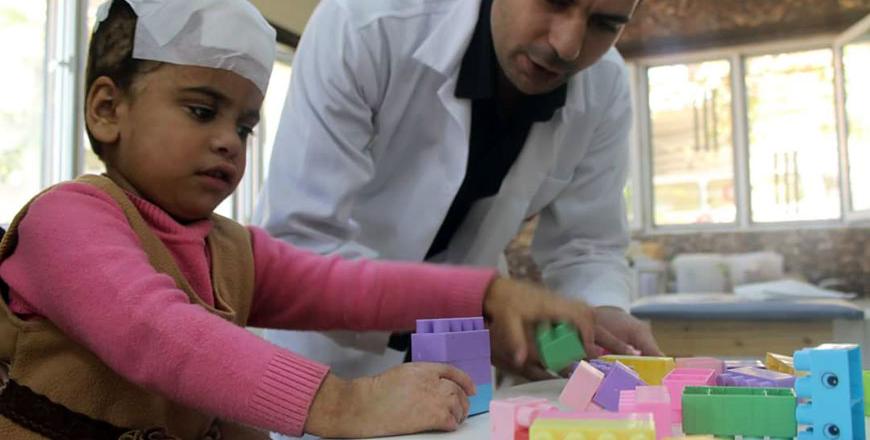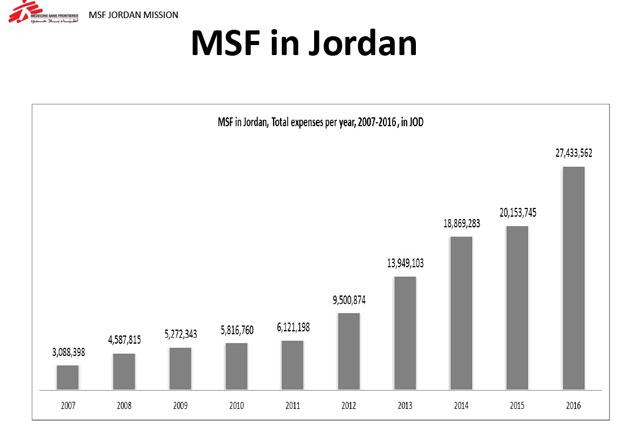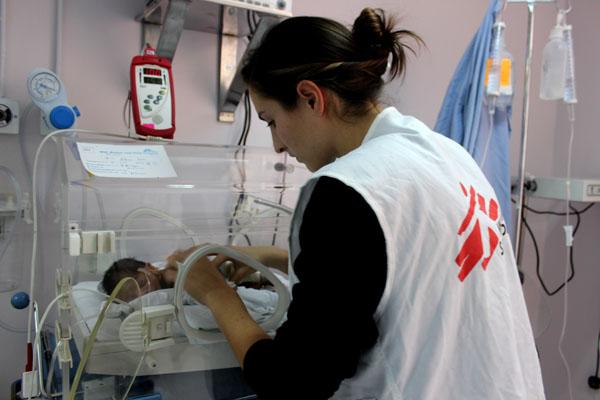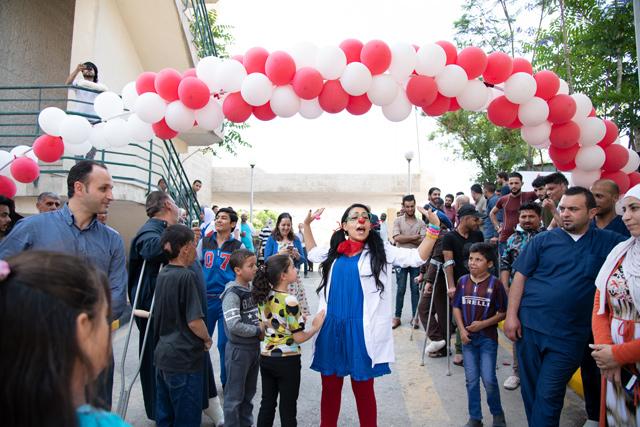You are here
Médecins Sans Frontières in Jordan delivers healthcare to war wounded from around region
By Dana Al Emam - Jul 07,2015 - Last updated at Jul 07,2015

The Médecins Sans Frontières mission in Jordan provides war wounded patients from Syria, Yemen, Iraq and Palestine with maxillofacial, plastic and orthopaedic surgeries (Photo courtesy of MSF)
AMMAN — Hanan from Iraq and Najwa from Gaza now call themselves “neighbours”, as their rooms at the new Médecins Sans Frontières (MSF) Hospital for Reconstructive Surgery are in the same corner.
Middle-aged Hanan lost a limb and her entire family in 2007 when a rocket hit their house in Iraq, while Najwa’s left leg was injured when a barrel bomb fell on her house in the recent Israeli aggression on Gaza.
“We spend most of our time together talking about everything, mainly our families,” Hanan told The Jordan Times in a recent interview, adding that she has been receiving medical care from MSF for the past seven months.
“I am doing much better now,” Hanan said, while holding on to her crutches, voicing hope that she could undergo a left knee replacement to treat her injury.
Najwa was preparing for her first reconstructive surgery, which took place last week, after receiving medical treatment at the facility over the past three months.
The two women are among some 200 patients receiving medical treatment at the new MSF hospital, which will officially be inaugurated on August 25.
The MSF hospital will carry on with the organisation’s mission in Jordan to provide war wounded patients from Syria, Yemen, Iraq and Palestine with maxillofacial, plastic and orthopaedic surgeries, its director, Sharif Alam, said.
In a recent interview with The Jordan Times, he said the eight-storey hospital is expected to admit 50-60 patients daily once it is up and running, and two floors are allocated for surgical work, with advanced isolation measures for infection control.
Alam explained that the majority of patients have complex conditions and infections.
During their average 150-day stay at the hospital, patients of all ages are provided with psychosocial support, in addition to entertainment activities for children, who constitute up to 20 per cent of the patients.
Physiotherapist Salim Abdulal, who is one of 160 medical and non-medical staff working at the MSF hospital, said dealing with war injured patients is “very different and more complex” than average cases.
He added that the duration of treatment for war-wounded patients is longer and is continuous as patients usually undergo more than one reconstructive surgery, noting that that war wounded patients are younger than typical patients.
“The aim of physiotherapy sessions also differs, as war wounded patients hope to avoid amputation or disabilities, while average patients seek to minimise pain.”
Preparations for the hospital are in the final stages, according to Marc Schakal, MSF head of mission in Jordan and Iraq, who said the organisation recruited new medical staff for the intensive care and surgical units.
The previous MSF facility used to be a single floor at the Red Crescent Hospital in east Amman, while the new one occupies the entire building of the former Mowasat Hospital in the capital’s Marka neighbourhood.
Admission of new patients is also ongoing, with around 30 patients admitted to hospital last month and around 45 to 50 this month, Schakal said, adding that more patients will also be admitted in July.
“We hope that we can upgrade orthopaedic surgeries by doing joint replacements, like hip replacement,” he said, expecting MSF to start offering joint replacement services for its patients by the end of this year or by next year.
With a seven-year project duration and a JD50 million budget, the mission seeks to sustain its services by developing a teaching and training capacity that local partners and doctors can continue with, according to Schakal.
“Today, the main gap we identify for wounded people is the capacity to recover from the injury because most of the patients receive emergency surgery then they are left alone… Our added value is in helping them recover.”
Since MSF started operating in Jordan in 2006, it has treated over 3,600 cases, including those who returned for additional surgeries.
The France-based non-profit medical and humanitarian organisation provides free medical care to communities affected by natural disasters, armed conflicts and disease outbreaks.
A recipient of the Nobel Peace Prize in 1999 and the King Hussein Foundation Humanitarian Leadership Prize in 2004, MSF provides its services through 19 offices and an international headquarters in Geneva, Switzerland.
Like many other patients at the hospital, Hanan and Najwa acknowledge that they would have never had access to such healthcare in their countries under the current conditions.
Related Articles
AMMAN — Two years ago, five-year-old Noor stepped on a landmine in a street in the Iraqi city of Fallujah.For the last three months, she has
Médecins Sans Frontières (MSF) in Amman seeks to upgrade its medical services for war-wounded patients in the region in a new setup that will be launched soon, according to Marc Schakal, MSF head of mission in Jordan and Iraq.
MARKA — Victims of regional conflicts have been Medecins Sans Frontieres (MSF) Amman Reconstructive Surgery Hospital, where teams of surgeon

















